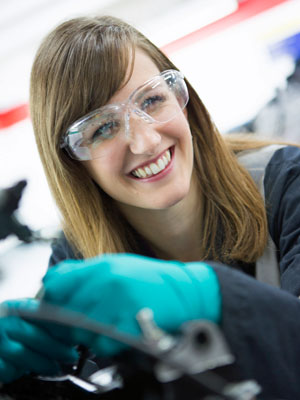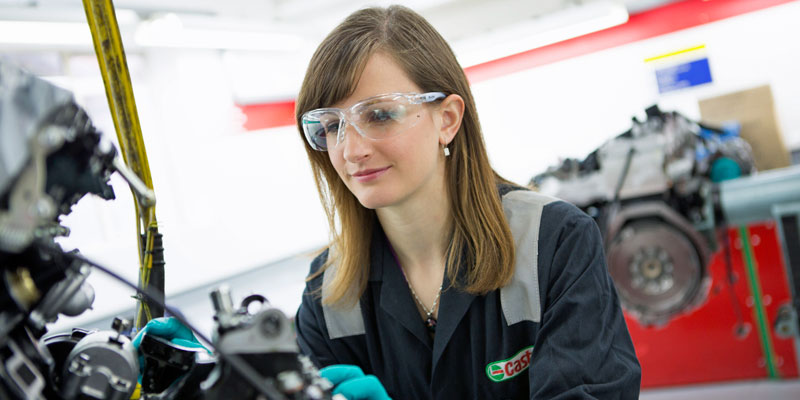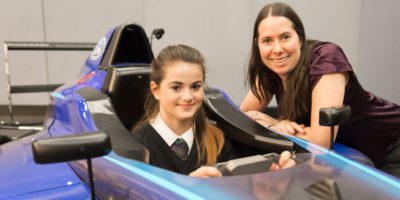Ruth Poultney is a fuels development technologist within the Global Fuels Technology division at BP where she now works in the Diesel Product Development team, designing and testing new fuel formulations to optimise and improve their performance in diesel engines. She joined BP as a graduate in 2010 following her graduation from Durham University where she studied Chemistry. Prior to this Ruth spent a sandwich year as a synthetic chemist at AstraZeneca.

“…as you go around all the different placements you gain a clearer idea of what you like and what skills you possess… Your ideas are different from when you first start because of what you’ve learnt and the newfound awareness of the skills that you possess…”
Chemistry – a matter of choice
I studied a Masters in Chemistry at Durham University, which included an industrial placement year in the final year of study. I completed my placement year in synthetic organic chemistry at AstraZeneca working within drug discovery. It was really exciting to be using chemistry to synthesise a drug that could ultimately become commercially available. I realised that I enjoyed working as an industrial chemist as it was an opportunity to use science to create new products and revenue for the business.
During this placement, I discovered that I really enjoyed working in industry so I applied for chemistry jobs in industry, and luckily, found a place at BP and I joined as graduate chemist in the Global Fuels and Lubricants Technology division. I have completed placements in Lubricants Product Development, Automotive Engineering and Gasoline Product Development.
Finding a job at BP is exciting as you can see the product you have created on the shelf or at the petrol station!
My current role
The BP Graduate programme allowed me to experience three different areas of technology. My final rotation involved working in fuels product development, working in the gasoline product development team. After finishing I went on to stay in fuels product development but am now working in the diesel product development area as a permanent member as a fuels development technologist.
The experience of being a chemist working in an engineering team has helped me greatly to work in the fuels product development team and enabled me to make the link between chemistry and engineering. Having that understanding of how engines work helps me to understand the interaction between the engines and chemistry and essentially how a change in chemistry impacts an engine.
Fuelled by variety
I love the variety in my job. I have been at BP for five years and have already worked in a number of different departments during my rotations, each with different technical challenges. In addition I have organised courses, designed a notebook cover and even written an interview!
As you move around rotations you refine your skills in each area, from lubricants and their formulation to engine tests and fuels.
I’ve learnt a lot more about the route to market through working in the fuels division – how our products move from development to being in the forecourt. Learning how to turn a product into something that is transported from refineries to terminals to forecourts has been a really interesting and exciting aspect of my experience- that was my target and I’m glad to have been involved.
Refining my ideas
On a more general note, as you go around all the different placements you gain a clearer idea of what you like and what skills you possess. I’ve found that as I’ve gone through I’ve continued to refine my ideas – the experiences that you have lead you into areas that you are interested in.
Your ideas are different from when you first start because of what you’ve learnt and the newfound awareness of the skills that you possess. The graduate scheme is a wonderful experience – to have the opportunity to work in so many different departments, building up a network of contacts and helping me to refine what I would like to pursue in the future.
Embracing diversity in the workplace
One of the initiatives for our site has been to embrace the diversity in our workplace. Karen Brady visited in order to share her experiences of managing a football club as a young woman. We hosted an Apprentice style challenge to mark the occasion, and I participated in one of the teams. Two teams were given the challenge of designing a product which would be distributed to everyone on site to remind them of the diversity in our business.
You’re hired..!
During the day, I helped to design and develop a prototype of a notebook cover. The cover contained pockets which people can slot photos in of themselves of their hobbies to show their personality and learn more about their colleagues. We spent the morning generating lots of ideas and sketches and in the afternoon we worked with a design agency making our design come to life.
The whole day was videoed and shown just before Karen Brady’s speech. This was a great opportunity to be involved in a creative project and a unique chance to see a design idea change from a sketch to a finished product.
Bringing down CO2 emissions
One of the most exciting projects I have worked on at BP has been an investigation into low viscosity car engine oils. Fuel economy is becoming increasingly important as the cost of fuel grows and legislation restricting the amount of CO2 emissions becomes increasingly challenging to meet.
One way to improve fuel economy in your vehicle is to use a less viscous engine oil to reduce friction. My project has been to develop car engine oils with lower viscosity and investigate the effect of using a thinner lubricant on wear in the engine. This was a really exciting challenge, and an opportunity to use my chemistry knowledge to research a real-life problem.
However, there are many more demands on a lubricant than fuel economy. A lubricant must be compatible with engine technology such as particulate filters and catalysts. It must also be stable to oxidation and be able to keep the engine clean so that it performs well. This means that a lubricant needs many different chemical additives to ensure that it meets these demanding, and often conflicting, criteria.
Developing new molecules and chemistries
A thinner lubricant is beneficial for fuel economy, but will often affect the durability of the lubricant. Therefore, new molecules and chemistries are essential to meet the increasing demands on the lubricant. The biggest challenge is to be able to balance the additives and the performance of the lubricant so it is able to perform in all fields. Part of this challenge was to identify low viscosity lubricants that still had good wear and durability performance, and this was my role.
I formulated a range of low viscosity lubricants using a range of additives in order to evaluate their wear performance in analytical tests, rig tests and engine tests. This was a great opportunity to formulate novel lubricants using new chemical additives, and use my chemistry background to understand the role and function of each additive.
One of the biggest challenges is understanding the performance effect of each additive, when it is composed of many different additives and molecules so it’s really important to design a scientific experiment and view all of the analysis critically.
Testing engines
I also worked in our engine test department in order to install an engine test to evaluate the wear performance. This was a really difficult task as I needed to learn lots of new skills such as how to programme an engine using computer software, how to operate the engine using the software and even how to strip and build the engine.
I also investigated and utilised a range of novel techniques including scanning electron microscopy, light interferometry and aeration measurement to measure and understand the wear behaviour. Being involved in the project from start to finish though meant that I could develop a really deep understanding of the test, the oil and the data.
At the interface between chemistry and engineering
As a chemist, this has been a great opportunity to work at the interface between chemistry and engineering. This has been a chance to investigate new techniques and learn new skills and put these into practise to work on a real world problem. It has involved learning lots of new skills, using new techniques and applying chemistry in new environments, but this is part of why it is so exciting to work at BP!
http://www.bp.com/en_gb/united-kingdom.html
https://twitter.com/BP_Careers
https://www.facebook.com/bpcareers
https://www.youtube.com/user/BPplc





